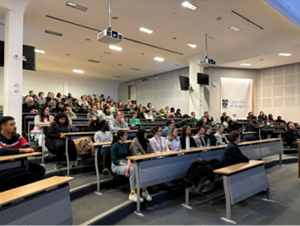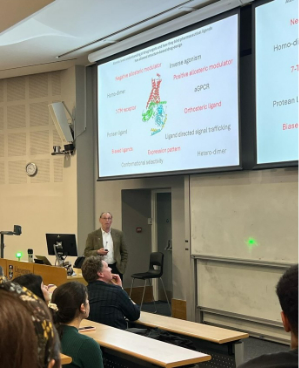Published: 16 Oct 2025
Category:
By Leah Howie & Maia Megase
Pharmacologists Make Glasgow: Glasgow Pharmacological Society’s Annual Seminar Celebrates the Groundbreaking Research Happening in Glasgow
What is the Glasgow Pharmacological Society (GPS)?
The GPS is a Glasgow-wide society, led by students and staff from the University of Glasgow, the University of Strathclyde, and Glasgow Caledonian University. The GPS have organised seminars for several years now, hosting annual seminars from established, prominent researchers and also hosting prestigious British Pharmacological Society (BPS) Bill Bowman and Dunlop Prize Lectures.
The goal of hosting these events is to bring together pharmacologists from all three universities in Glasgow - from undergraduates to professors - as well as members of the public, to share the new and exciting research happening in the pharmacological world.
2025 Annual Seminar: Linking In Vitro Pharmacology to In Vivo Drug Discovery
Our 2025 seminar promoted some of the world-leading research currently being undertaken within the city of Glasgow. On the 25
th March, the GPS were fortunate to host a seminar from Professor Graeme Milligan and Professor Andrew Tobin from the University of Glasgow. Speaking to a packed lecture theatre, their seminar – ‘Linking
in vitro pharmacology to
in vivo drug discovery’ - explored their academic, philanthropic and commercial work through the University of Glasgow Centre for Translational Pharmacology and KelticPharma Therapeutics.

A major theme in the seminar was the relationship between G protein-coupled receptor (GPCR) structure and the distinct actions of ligands on receptor function. A key example was the differential effect of biased and allosteric ligands on the modulation of Free Fatty Acid 2 (FFA2) receptor-dependent glucagon-like peptide-1 (GLP-1) release in gut tissues. Therapeutic approaches designed to promote GLP-1 signalling have surged in popularity as treatments for both obesity and type 2 diabetes, largely due to their effectiveness in promoting weight loss and improving glycaemic control. Therefore, modulating GLP-1 release has important clinical implications for the treatment of obesity and diabetes. The talk also showed how Free Fatty Acid receptors represent a target for the treatment of asthma. In this case, TUG-891, an agonist for the FFA4 receptor, was shown to promote airway relaxation.

GPCR structure-based drug design was further explored within the context of Alzheimer’s disease. Exciting
in vitro and
in vivo data highlighted the potential roles of muscarinic M1 receptor partial agonism and allosteric modulation in the development of safer, more effective treatments for Alzheimer's disease.
The seminar concluded with a discussion on protein kinase structure-based drug design. Specifically,
Plasmodium’s vast kinome provides a reservoir of drug targets, with the protein kinase PfCLK3 proving an exciting multi-stage, cross species target. The seminar explained how these findings led to the formation of KelticPharma Therapeutics in order to develop anti-malarial ligands targeting PfCLK3, potentially providing novel therapies that are affordable, safe, prophylactic, and curative.
.
 Looking to the future
Looking to the future
The GPS plans to continue hosting similar events, expanding the Glasgow pharmacology network and promoting exciting advances in our discipline. Follow us on LinkedIn (
Glasgow Pharmacological Society) and Instagram (
glasgowpharmsoc) for all things pharmacology, including details of our upcoming events.
Acknowledgments
Thanks to Dr Yvonne Dempsie, Dr Kenneth Watterson and Dr Nicholas Klemm, and to our fellow students; Kirsty Tinto, Kacey Campbell, Sasanka Yilan, and Sophie Bryant, who played a central role in organising this event. The GPS would also like to thank the BPS Ambassadors Scheme and University of Glasgow School of Cardiovascular and Metabolic Health for funding this event. Lastly, we would of course like to thank Professor Milligan and Professor Tobin for providing such a thought-provoking lecture, and to our amazing audience for coming along. We look forward to our next seminar and hope to see you there! disprove this theory. Initially, I found the range of lab techniques difficult to get my head around, but fortunately my supervisor and the rest of my lab colleagues were very helpful and patient.
Comments
If you are a British Pharmacological Society member, please
sign in to post comments.